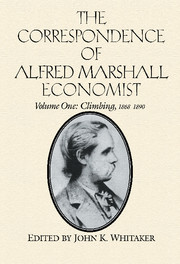Book contents
- Frontmatter
- Contents
- Acknowledgements
- General Introduction
- Editorial Practices
- Alfred Marshall: A Sketch
- Abbreviations
- List of Manuscript Collections
- Biographical Register
- Chronology 1842–1890
- List of Letters Reproduced in Volume 1
- LETTERS 1–332
- Appendices
- I Alfred Marshall's Family
- II Marshall's Testimonials for the Principalship of University College Bristol, June 1877
- III Foxwell's Initiative
- IV The 1889 Debate on Reform of the Moral Sciences Tripos
V - Is London Healthy?
Published online by Cambridge University Press: 29 March 2010
- Frontmatter
- Contents
- Acknowledgements
- General Introduction
- Editorial Practices
- Alfred Marshall: A Sketch
- Abbreviations
- List of Manuscript Collections
- Biographical Register
- Chronology 1842–1890
- List of Letters Reproduced in Volume 1
- LETTERS 1–332
- Appendices
- I Alfred Marshall's Family
- II Marshall's Testimonials for the Principalship of University College Bristol, June 1877
- III Foxwell's Initiative
- IV The 1889 Debate on Reform of the Moral Sciences Tripos
Summary
The following short note published under Marshall's name in the Pall Mall Gazette, 13 April 1887, has the air of a letter to the editor and seems worth reproducing given its general inaccessibility.
Is London Healthy?
By Professor Alfred Marshall.It is true that the death rate of London is only a little above the average. But people die of consumption in Torquay and Mentone, not because those places are specially unhealthy, but because those who have weak lungs go to them. In like manner many people live long in London, not because London is healthy, but because their exceptional health and strength induced them to come to London. There are more than a million people living in London who were born elsewhere. Most of them when they came were picked lives, the strongest member of their several parishes; those who, having the best income-earning power, and being the least liable to illness, had most to hope and least to fear from playing for the high stakes of London life. More than half a million London-born people are living elsewhere, and of these a great part went away because they felt themselves unequal to the strain of London life. The death rate of women in London between the ages of fifteen and twenty-five is remarkably low, and this seems to be due to the two facts that the conditions of life of domestic servants are favourable, and that young people who come to London to earn their living are likely to go home as soon as they get ill; they thus swell the death rates of healthy country parishes.
- Type
- Chapter
- Information
- The Correspondence of Alfred Marshall, Economist , pp. 367 - 368Publisher: Cambridge University PressPrint publication year: 1996



